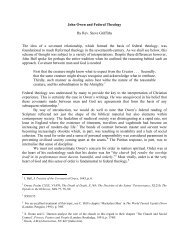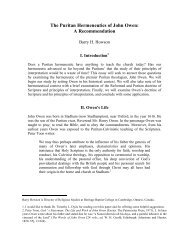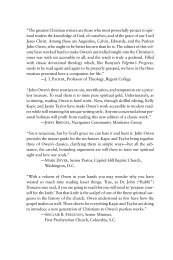M.TH. LONG DISSERTATION (LD6.1) - John Owen
M.TH. LONG DISSERTATION (LD6.1) - John Owen
M.TH. LONG DISSERTATION (LD6.1) - John Owen
You also want an ePaper? Increase the reach of your titles
YUMPU automatically turns print PDFs into web optimized ePapers that Google loves.
<strong>John</strong> <strong>Owen</strong>’s Theological Context<br />
eternity; in him they have every spiritual blessing; therefore they are justified from<br />
eternity. <strong>Owen</strong> regards the decree of election as the cause of Christ’s satisfaction, and<br />
the foundation for the whole covenant of grace. 165 However, in contrast to Crisp and<br />
Saltmarsh, he insists that although prior to the cross the elect are beloved, elected, and<br />
ordained to eternal life, their actual condition, which they share with all people, remains<br />
unchanged by the decree of election alone. 166 He offers three proofs.<br />
First, if the decree of election of itself caused a change in the elect, the decree of<br />
reprobation must also work a change in those appointed for condemnation. This is<br />
manifestly not the case; if it were, they would already be suffering the consequences of<br />
the decree, and would merely need to be made aware of the fact.<br />
Secondly, God’s eternal purpose is not the same as the mighty act of his power.<br />
God’s decrees guarantee the certain futurition of the events decreed, but they do not<br />
accomplish their actual existence. In so distinguishing God’s decrees from his actions,<br />
<strong>Owen</strong> stands in the western catholic mainstream. For example, Aquinas, whilst not using<br />
the language of decrees, discusses the issue in relation to God’s knowledge. According to<br />
Aquinas, God’s knowledge, joined to his will, causes all things. Answering the objection<br />
that as God’s will is eternal, creatures must be eternal, he argues that ‘The knowledge of<br />
God is the cause of things according as things are in His knowledge. Now that things<br />
should be eternal was not in the knowledge of God; hence although the knowledge of<br />
God is eternal, it does not follow that creatures are eternal.’ 167 This distinction between<br />
God’s decrees and his acts is also standard among the Reformed Orthodox. 168 Turretin,<br />
165 <strong>Owen</strong> 1850-55: X.455.<br />
166 <strong>Owen</strong> 1850-55: X.456f.<br />
167 Aquinas 1964-73: Ia.q.14.a.8.<br />
168 E.g. Ames 1968: I.vii.37; compare also I.vii.7 with I.viii.8; Pictet 1834: III.2; Turretin 1992-97: IV.ii.10;<br />
Westminster Confession of Faith III.6.<br />
45





